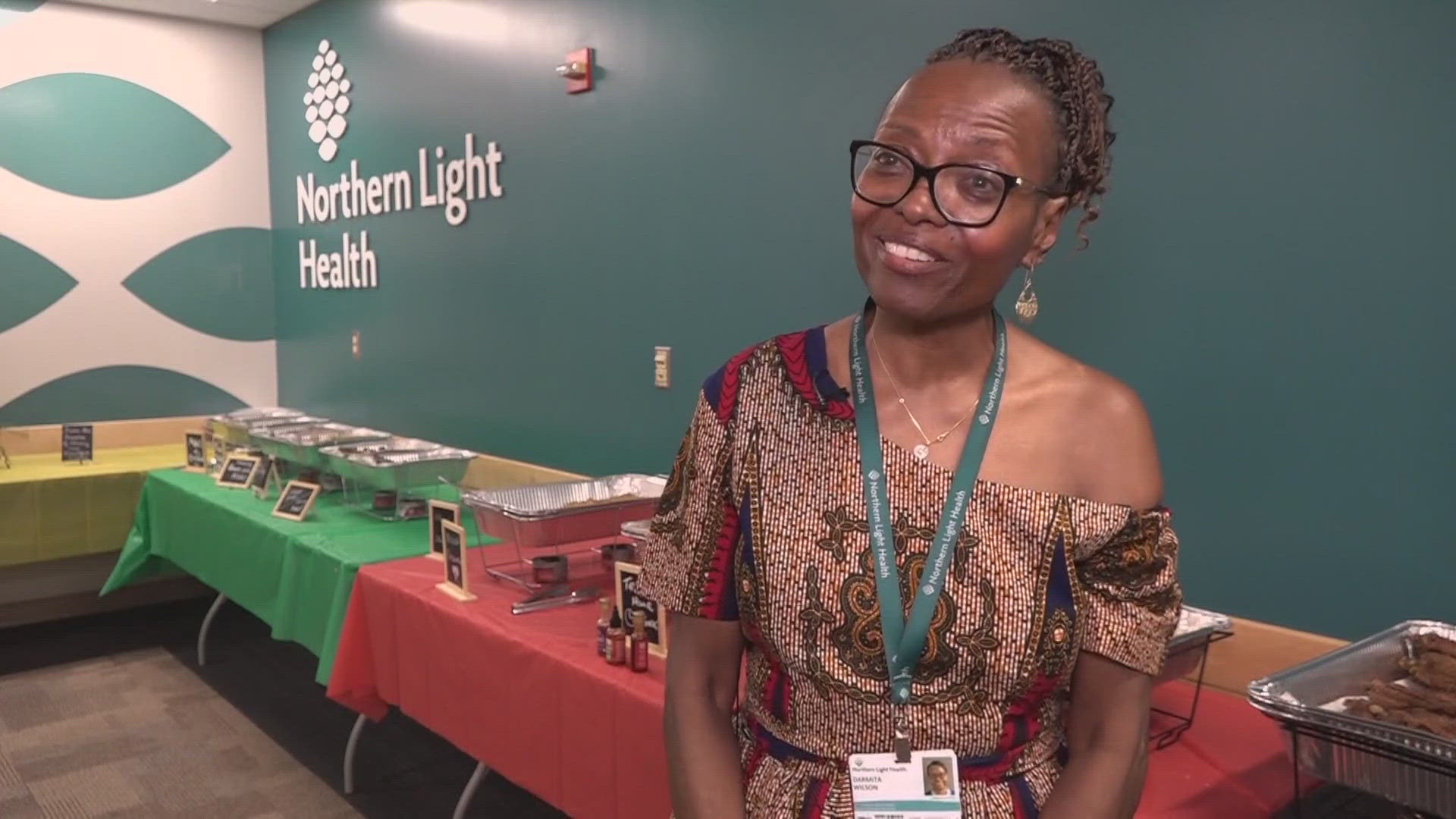BREWER, Maine — Many businesses and organizations will be observing the Juneteenth holiday Wednesday, June 19, recognizing it as a celebration of the emancipation or ending of slavery for African Americans in 1865.
Ahead of the holiday, on Tuesday, Northern Light Health's Vice President of Medical Education Darmita Wilson hosted a Juneteenth celebration event, sharing her family's 156-year tradition of celebrating the holiday with her Northern Light Health family, providing a clear example of what it means to take up space as a Black professional, and what's at risk when an environment lacks diversity.
"We lose the opportunity to have a voice. We lose the opportunity to be present when decisions are made," Wilson said. "Equity is more than just being equal. Equity is meeting people where they are. What's equitable for me may not be equitable for someone else."
The deep south of Alabama is where Wilson's family celebrations of Juneteenth began. It was 1867, well before Wilson's time, when her great-great-grandparents Jeff and Katherine Willis started the tradition. The Willis' taught Wilson's great-grandma, Laura Willis Russel Vaxter, her way around the kitchen.
From there, Vaxter passed the tradition down to her all 17 of great-grandchildren, including Wilson. Wilson said she learned how to cook the meals that have filled her family's dinner tables when she was just five years old.
"We would have to watch her prepare the family meal," she said. "And because they were all verbal recipes, she said, 'It should stir like this. It should feel like this.'"
More than 150 oral recipes were passed down from Grandma Vaxter, who Wilson said was a former slave. Wilson said when she got older, it was a surprise to her that measurements existed because she had learned to cook by eyeballing ingredients.
For Wilson, one must-have at the table is the "Ten-hour pork," which she said is a test of patience. Wilson said to prepare the meal, you have to find the right cut of meat, trim it properly, marinate the pork in seasonings for four or five days, and when cooking, you must be sure not to cook it too fast or too slow.
The dish takes up space just like many of the other cuisines on the table, but is symbolic of filling a key role that is unique to itself, just as Wilson said Black professionals do.
"My grandmother always told me if you have the opportunity to ever get to the table, you need to bring the spice," Wilson said.
And when Black individuals enter rooms and fill important spaces and roles in their respective professions, Wilson said there's a way to be the "Ten-hour pork."
"You need to know exactly why you're there; you need to know that you're enough," Wilson said. "And you need to bring all the people whose shoulders that you stood on with you, and you also need to prepare the way for those that are coming after you."
Wilson said Northern Light Health's CEO Timothy Dentry created a space for her. As many companies and institutions across the country are weeding out diversity, equity, and inclusion programs, Dentry said he is maintaining a diverse environment where staff from all ethnic backgrounds are welcome.
"When I see what organizations are doing along those lines, it really breaks my heart, because again, it starts with our culture that cares for one another," Dentry said.
Dentry said since COVID, Northern Light Health has twice as many people of color and people from various nationalities that now work at Northern Light Health.
With diversity, comes the opportunity to share culture, Northern Light Health recruiter Emily Tadlock said, which can sometimes be uncomfortable, like learning about how hush puppies got their names.
"I never knew what the meaning behind what a hush puppy really was, and it was to hush the hounds so that the slaves could get away," Tadlock said.
Family stories passed down during slavery imply that slaves used hush puppies when escaping from plantations, Wilson said. Slaves would throw small, fried pieces of cornmeal at hound dogs, and the dogs would slow down to eat, keeping quiet as slaves got away. By learning how racial implications are interwoven into and heavily impact American history, people gain understanding and compassion, Tadlock said.
"I will never eat a hush puppy without thinking about that now," Tadlock said. "And I wouldn't have known that if it hadn't been for Darmita and this experience here today."
Wilson uses culture sharing to add value in her professional environment.
"It's the Northern Light way," Wilson said. "We want to learn about each other because in learning about each other, we learn about our patients."
Wilson said Black professionals should "straighten their crowns and walk" in every room that has space.
"You need to not be afraid of your voice. You need to make sure that your share is important," Wilson said. "It's necessary. It's required, but you have to speak from a place of knowledge. Know what you're talking about, have the data with you, and challenge it."

